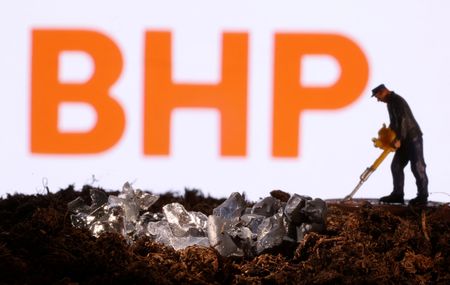SANTIAGO (Reuters) – Mining giants BHP and Antofagasta Minerals said on Wednesday that a mining royalty bill in Chile would affect competitiveness and encourage miners to reevaluate investments.
Chile is the world’s top copper producing nation and the government has proposed a royalty with a portion based on sales and the other subject to profitability, which progresses as the price of copper increases.
Speaking to Chile’s Congress, BHP’s vice president of corporate affairs for the Americas, Rene Muga, said the current bill would impact the company’s competitiveness abroad and negatively impact its own operations in other countries.
“It is our duty to warn that in a highly competitive global world, Chile cannot disproportionately increase its taxes without significantly affecting investment levels,” Muga said.
He added that the initiative would lead the mining company to reconsider an announced investment portfolio of $10 billion, since it was designed “without considering such an excessive tax burden increase.”
For his part, the vice president of corporate affairs of Antofagasta Minerals , Rene Aguilar, pointed out that with the proposed changes, total taxation would exceed 48%, putting it on par with high-tax countries such as Congo, Mongolia and Zambia.
“It is essential to consider the depreciation of investments in the calculation of mining income,” Aguilar said. “This is a very relevant point, especially for groups like Antofagasta, which has a potential investment portfolio of close to $5 billion for the coming years.”
Both company representatives acknowledged that there’s room for more contribution from the mining sector, but pushed for collaborative agreements that maintain business sustainability.
Other global mining giants like state-owned Codelco, Glencore, Anglo American and Freeport-McMoRan also operate in Chile.
(Report by Fabian Cambero; Writing by Alexander Villegas; Editing by Alistair Bell)

